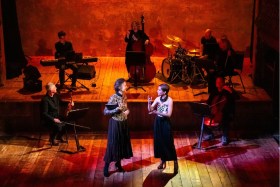First it was Madonna, then Gwyneth, followed by Matt Damon and most recently, Woody Harrelson and Kyle McLachlan. This year has seen the profile of West End theatre lift considerably with the casting of A-List Hollywood stars in lead theatrical roles, some without previous stage experience. Suddenly the box office is ringing with the sounds of sell-out success, and going to the theatre is cool again.
Hundreds flocked to see pop queen Madonna in David Williamson’s art satire, Up for Grabs earlier this year. At the same time, Gwyneth Paltrow was treading the boards at the Donmar Warehouse in Proof. This is our Youth has brought two star-studded casts to the West End; Matt Damon, Casey Affleck and Summer Phoenix starred in the most recent version. Meanwhile Woody Harrelson and Kyle MacLachlan won praise in recent weeks for their roles in On an Average Day.
It’s been the stuff tabloid dreams are made of – Gwyneth-spottings and reports of Mad’s demands behind the scenes of Up for Grabs abounded in celebrity-obsessed Britain. But the integrity of West End productions began to be questioned, most recently when the National Theatre caused a stir when it was announced Glenn Close would play Blanche DuBois in the upcoming production of A Streetcar Named Desire, with another two foreign actors in the other lead roles.
Following complaints from performers, Actor’s union, Equity, claimed the publicly-funded National Theatre went too far by casting foreign actors in three of the four Streetcar leads at the expense of British talent and have called upon Trevor Nunn, the National Theatre’s Artistic Director, to discuss the issue with Equity officials.
‘The reason we were concerned about the National Theatre is because it’s a publicly funded theatre,’ said Equity spokesperson, Mr Martin Brown.
‘It was established to be the showcase for British performing arts and we thought it was simply inappropriate for three of the four leads in A Streetcar Named Desire to be given to overseas performers requiring a work permit,’ Mr Brown said.
Currently, there are a number of ways actors can cross the Atlantic. If they are determined to have international status, like Glenn Close, they are eligible for an instant work permit. There is also an exchange program operating between UK and US Equity organisations for lesser-known talent, whereby if a British actor is hired in a US production, a place will be held open for an American actor in Britain.
The National Theatre has responded by saying they are not sure what all the fuss is about when they followed all the criteria when casting Streetcar.
‘Glenn Close has international status, fully recognised by Equity,’ Ms Lucinda Morrison, spokesperson for the National Theatre, explained.
‘Robert Pastorelli is completing a British/American Equity exchange which has been open since the National Theatre production of Not About Nightingales went to America in 1998, in exchange for a British actor performing in America.
‘It’s also important to note that we still owe American Equity seven or eight places at the National for American actors in exchange for British actors in NT productions which have gone to America. As Equity themselves acknowledge, we followed all the correct procedures in casting Streetcar, there are 15 British actors in the cast,’ Ms Morrison said.
However, Americans may well lament about the British on Broadway, with a number of British actors winning awards this year over American talent.
Lindsay Duncan and Alan Bates both won Tony awards while Liam Neeson, Alan Rickman and Kate Burton all received nominations.
‘There have been more British performers working on Broadway this year than Americans working in the West End and it’s been like that for several years,’ Mr Brown acknowledged.
But there is concern that it is easier for Americans to work in the UK rather than vice-versa.
‘Our general position is that London audiences clearly want and deserve to see foreign actors of talent and renown on our stages. There is a wonderful interchange between the UK and the US communities, but there is great strength of feeling that this is a long way from being reciprocated abroad, particularly in New York,’ Ms Morrison said.
‘The answer is surely not to make it harder for foreign actors to work here but to make it easier for British actors to work abroad,’ she said.
Both the National Theatre and Equity are otherwise in agreement that Hollywood stars have created an electric atmosphere in the West End.
‘It has created this tremendous buzz. The West End is being talked about in the gossip columns, in the tabloid press. To create excitement around the theatre must be a good thing,’ Mr Brown said.
Here’s hoping the popularity of West End theatre will remain, with or without the Hollywood star attractions.




